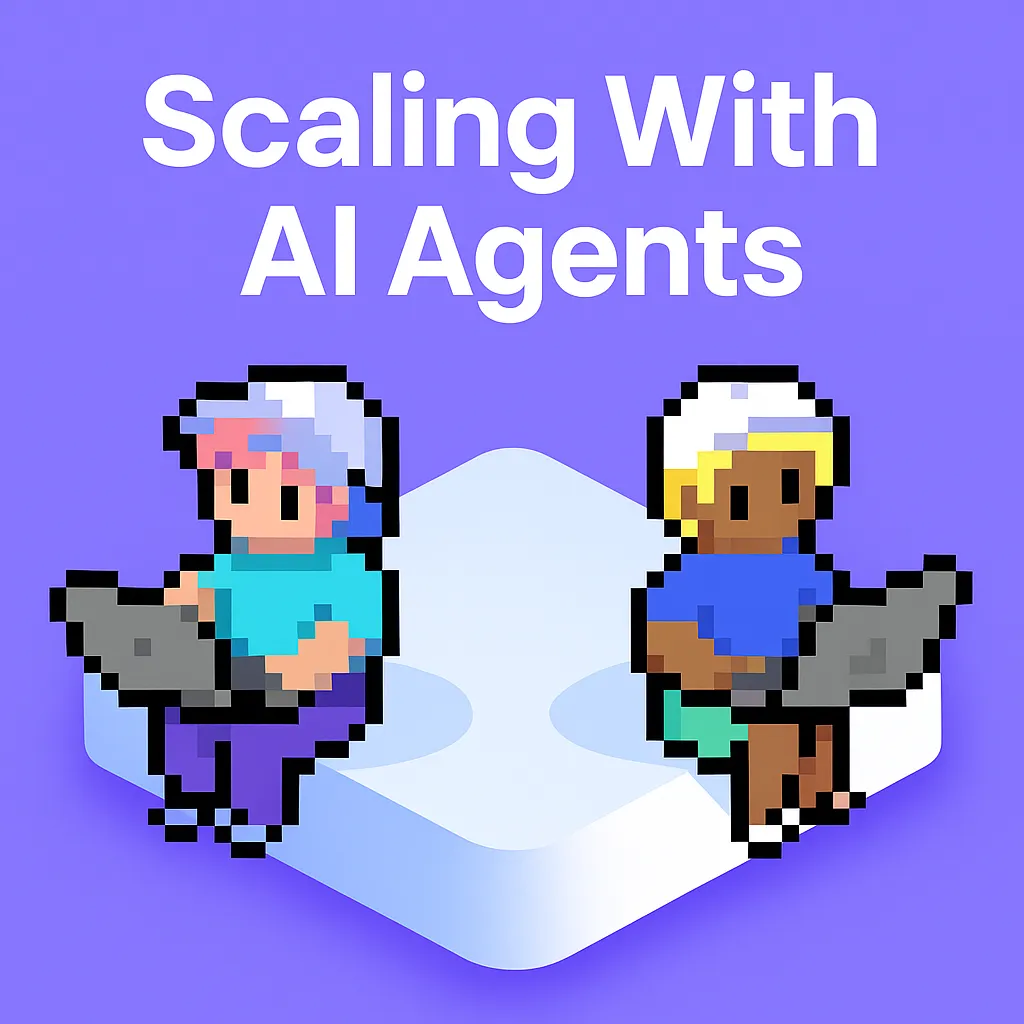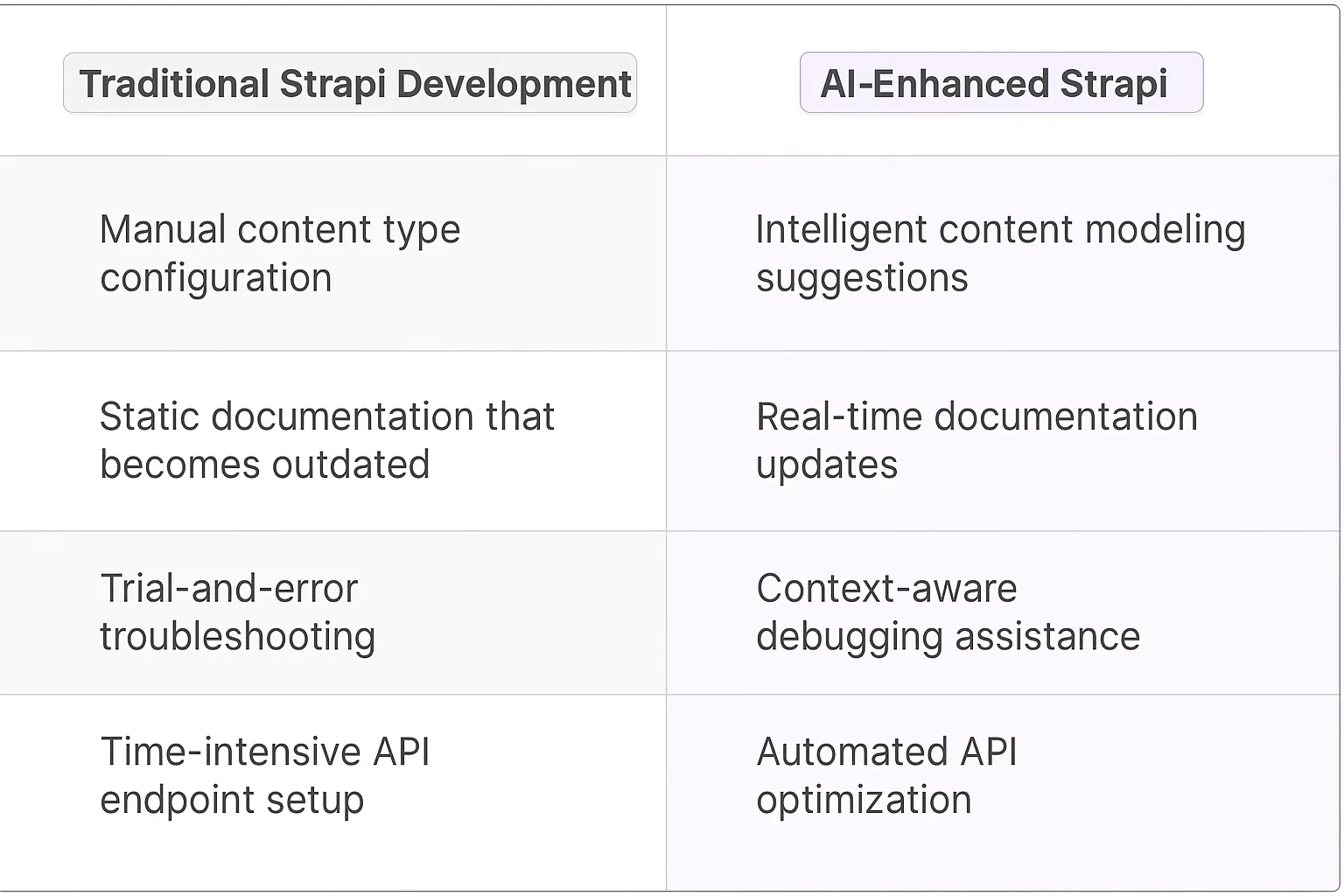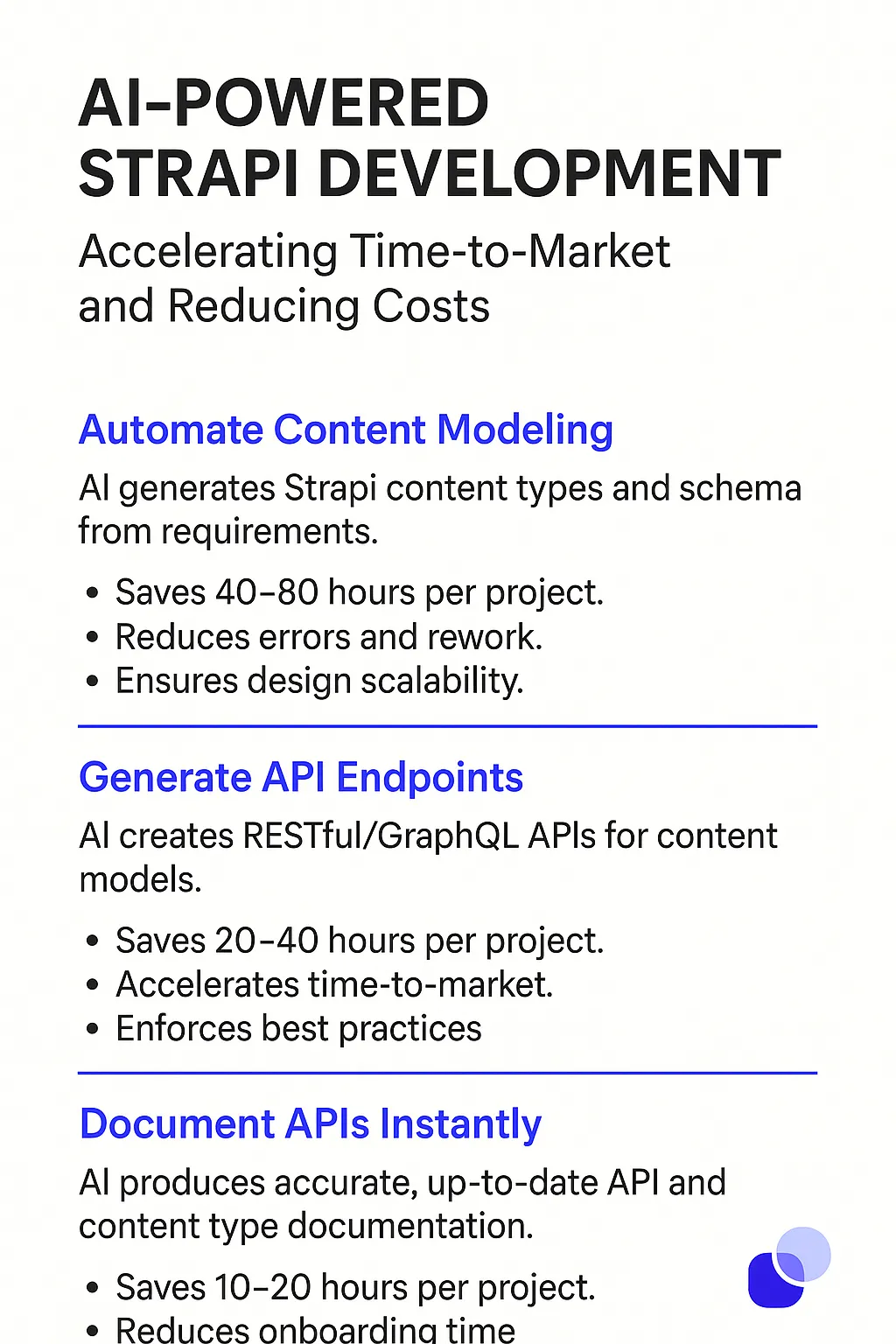Strapi
Understanding Strapi's Headless CMS Platform
Strapi stands as the leading open-source headless CMS, giving developers the freedom to build scalable content APIs while providing content teams with an intuitive management interface. Built on Node.js, Strapi delivers a flexible architecture that powers content for websites, mobile apps, and digital products across industries.
Key Features of Strapi
The platform excels through its customizable content types, robust REST and GraphQL APIs, and granular permissions system. Strapi's plugin architecture enables teams to extend core functionality while maintaining a clean, maintainable codebase. The self-hosted nature of Strapi gives organizations complete control over their content infrastructure and data.

Benefits of AI Agents for Strapi
What would have been used before AI Agents?
Before AI agents entered the Strapi ecosystem, developers spent countless hours manually configuring content types, setting up permissions, and writing documentation. The traditional approach involved repetitive tasks like creating content structures, managing API endpoints, and troubleshooting configuration issues. Teams relied on static documentation, community forums, and trial-and-error to solve problems.
What are the benefits of AI Agents?
AI agents transform how developers interact with Strapi's headless CMS by providing intelligent, context-aware support throughout the development lifecycle. These digital teammates can:
- Accelerate Content Modeling: AI agents analyze project requirements and automatically suggest optimal content type structures, reducing the time spent on database schema design from hours to minutes.
- Enhance API development: They generate and optimize API endpoints based on content relationships, implementing best practices for performance and security without requiring deep expertise in Strapi's architecture.
- Automate Documentation: The agents maintain up-to-date technical documentation that evolves with your project, documenting changes in real-time and ensuring team alignment.
- Debug with Context: When issues arise, AI agents analyze error patterns, configuration files, and logs to provide targeted solutions rather than generic troubleshooting steps.
- Optimize Performance: They continuously monitor system performance, suggesting improvements to queries, identifying bottlenecks, and recommending infrastructure adjustments based on usage patterns.
The network effects are particularly powerful here - as more developers use AI agents with Strapi, the knowledge base expands, making solutions more refined and contextual. This creates a compounding advantage for teams adopting these digital teammates in their Strapi development workflow.

Potential Use Cases of AI Agents with Strapi
Content Modeling & Schema Design
AI agents analyze existing content structures and recommend optimal content models for Strapi projects. They identify relationships between content types, suggest field configurations, and help developers implement database schemas that scale. The agents can evaluate content requirements and propose collection types that align with business objectives while maintaining clean architecture principles.
API Endpoint Generation
Digital teammates accelerate API development by generating and documenting RESTful endpoints based on content structures. They create standardized naming conventions, implement proper HTTP methods, and ensure API responses follow best practices. The agents can also suggest query parameters and filtering options that enhance API functionality.
Permission Management
AI agents optimize role-based access control by analyzing user workflows and suggesting granular permissions. They identify potential security gaps, recommend role configurations, and help implement least-privilege access patterns. The agents can generate permission matrices that balance security with operational needs.
Content Migration & Transformation
When transitioning between CMS platforms, AI agents streamline data migration by mapping content models, transforming data structures, and validating content integrity. They handle complex data relationships, maintain referential integrity, and ensure proper content organization in the new Strapi instance.
Plugin Development Support
AI agents provide guidance for custom plugin development by analyzing requirements, suggesting architectural approaches, and generating boilerplate code. They help developers understand Strapi's plugin system, implement hooks correctly, and follow established patterns for extending core functionality.
Performance Optimization
Digital teammates monitor system performance, identify bottlenecks, and suggest optimization strategies. They analyze database queries, API response times, and resource utilization to recommend improvements. The agents can help implement caching strategies and database indexing for better performance.
Content Validation Rules
AI agents create sophisticated validation rules for content types by analyzing data patterns and business requirements. They implement input validation, format checking, and relationship constraints that maintain data quality. The agents ensure content consistency across the platform while reducing manual validation effort.
Internationalization Setup
Digital teammates assist in configuring multi-language support by suggesting localization strategies, managing translation workflows, and implementing language fallbacks. They help structure content for different locales while maintaining SEO-friendly URLs and proper language routing.

Industry Use Cases
AI agents integrated with Strapi unlock powerful new capabilities for content teams and developers working with headless CMS platforms. The real magic happens when these digital teammates handle the heavy lifting across different business contexts. From media companies managing vast content libraries to ecommerce brands coordinating product information, Strapi's AI agents adapt to distinct industry needs while maintaining the platform's core flexibility.
What makes these use cases particularly compelling is how they enhance Strapi's existing strengths in content modeling and API-first architecture. Rather than bolting on AI as an afterthought, these agents work natively within Strapi's interface to augment human capabilities. They learn from your content structure, understand relationships between different content types, and help teams work more effectively within their established workflows.
The following examples demonstrate how different sectors leverage AI agents in Strapi to solve unique challenges while maintaining content quality and brand consistency. Each case reveals practical applications that go beyond surface-level automation to deliver meaningful business impact.
Media Publishing: AI-Powered Content Management with Strapi
Digital publishing teams face intense pressure to produce high-quality content at scale while maintaining editorial standards. The integration of AI agents within Strapi's headless CMS creates a powerful system for modern newsrooms and media organizations.
A media company using Strapi AI agents can automate critical parts of their content workflow. When editors upload new articles, the AI analyzes the content in real-time to generate SEO-optimized meta descriptions, suggest relevant tags, and identify related content from the existing library. This reduces manual tagging work while improving content discoverability.
The AI agent also acts as a quality control layer, checking articles against the publication's style guide, flagging potential factual inconsistencies, and ensuring proper source attribution. For multimedia content, it can automatically generate transcripts, create descriptive alt text for images, and suggest optimal thumbnail frames from videos.
One of the most valuable capabilities is intelligent content repurposing. The AI agent can take long-form articles and automatically create variations optimized for different platforms - from social media snippets to newsletter summaries. It maintains the original message while adapting the tone and format for each channel.
The data shows that media organizations using AI-enhanced Strapi systems see a 40% reduction in time spent on repetitive content tasks. This allows editorial teams to focus on high-value activities like deep reporting and building audience relationships. The system becomes more effective over time as it learns from usage patterns and editorial decisions.
For media companies looking to scale their digital presence while maintaining quality, integrating AI capabilities into their Strapi CMS provides a significant competitive advantage. The key is implementing it thoughtfully to augment rather than replace human editorial judgment.
E-commerce: Scaling Product Management Through AI-Enhanced Strapi
Growth-stage e-commerce companies hit a critical inflection point when manual product management becomes unsustainable. The integration of AI agents with Strapi creates a multiplicative effect on what merchandising teams can accomplish.
The most successful e-commerce implementations leverage AI agents to handle the heavy lifting of product data enrichment. When merchants add new items to their catalog, the AI automatically generates compelling product descriptions, extracts key features, and creates variant combinations - tasks that traditionally consumed hours of manual work.
What's particularly powerful is how the AI agent learns the brand's unique voice and styling preferences. After analyzing existing product copy and marketing materials, it can generate new descriptions that maintain consistent messaging while optimizing for conversion. The system gets smarter with each interaction, incorporating feedback from the merchandising team.
Smart categorization represents another game-changing capability. The AI analyzes product images, descriptions, and metadata to automatically slot items into the correct taxonomy. It can even suggest new category structures based on emerging patterns in the product catalog. This level of intelligent organization becomes crucial as catalogs grow into the thousands of SKUs.
Data from leading e-commerce brands shows that AI-enhanced Strapi deployments reduce new product setup time by 60% while improving data quality metrics. The system also enables rapid scaling of seasonal campaigns by automatically generating holiday bundles and gift guides based on historical performance data.
The network effects become apparent as the AI agent builds a deeper understanding of the product catalog. It can surface real-time insights about inventory gaps, predict emerging category trends, and identify opportunities for product line expansion. This creates a powerful feedback loop between the merchandising team and the AI system.
For e-commerce companies hitting scale, the combination of Strapi's flexible architecture and AI-powered automation provides the infrastructure needed to support exponential growth while maintaining brand consistency and product data quality.
Considerations and Challenges
Implementing AI agents within Strapi environments requires careful planning and strategic thinking around several key areas. The integration complexity varies based on your content architecture and specific use cases.
Technical Challenges
The Strapi API structure presents unique integration hurdles when connecting AI agents to existing content types and relationships. Teams need to carefully map AI agent interactions with Strapi's permission system and role-based access controls. The data flow between AI agents and Strapi's content management API requires thorough validation and error handling.
Custom field types and components may need modification to properly capture AI-generated content and metadata. Teams should plan for:
- API rate limiting and throttling mechanisms
- Content validation rules for AI-generated data
- Proper error handling for failed AI operations
- Version control for AI-modified content
Operational Challenges
Beyond the technical aspects, organizations face operational hurdles when deploying AI agents in Strapi. Content teams need clear guidelines on when to leverage AI capabilities versus manual content creation. Training requirements increase as teams must understand both Strapi's interface and AI agent interactions.
Key operational considerations include:
- Content quality assurance processes for AI-generated material
- Workflow adjustments to incorporate AI review steps
- Team training on AI agent capabilities and limitations
- Cost monitoring and optimization of AI API usage
- Performance metrics tracking for AI-assisted operations
Organizations should establish clear governance policies around AI agent usage and maintain detailed documentation of integration points and custom configurations. Regular audits of AI-generated content help ensure consistency with brand voice and quality standards.
The API integration complexity can be significant, particularly when dealing with custom content types and complex relationships between different data models.
AI Agents: The Future of Digital Content Management
The integration of AI agents with Strapi represents a step change in how organizations manage digital content at scale. While the implementation requires careful consideration of technical and operational factors, the benefits are compelling. Teams that successfully deploy these digital teammates see dramatic improvements in productivity, content quality, and their ability to scale operations. The key lies in thoughtful implementation that augments human capabilities rather than replacing them. As AI agent technology continues to evolve, their role in content management will only grow more central to how modern organizations operate.













